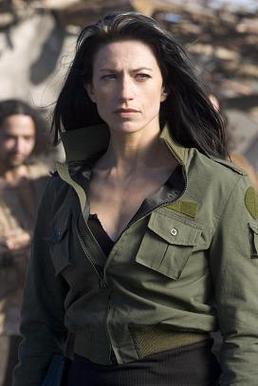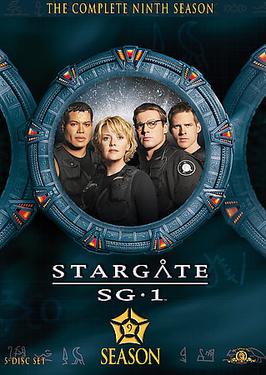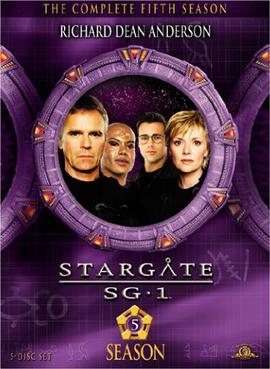Related Research Articles
Stargate SG-1 is a military science fiction adventure television series within Metro-Goldwyn-Mayer's Stargate franchise. The show, created by Brad Wright and Jonathan Glassner, is based on the 1994 science fiction film Stargate by Dean Devlin and Roland Emmerich. The television series was filmed in and around the city of Vancouver, British Columbia, Canada. The series premiered on Showtime on July 27, 1997, and moved to the Sci Fi Channel on June 7, 2002; the final episode first aired on Sky1 on March 13, 2007.

Farscape is an Australian-American science fiction television series, produced originally for the Nine Network. It premiered in the US on Sci-Fi Channel's SciFi Friday, 19 March 1999, at 8:00 pm EST as their anchor series. The series was conceived by Rockne S. O'Bannon and produced by The Jim Henson Company and Hallmark Entertainment. The Jim Henson Company was responsible for the various alien make-up and prosthetics, and two regular characters are entirely Creature Shop creations.

Jonathan J. "Jack" O'Neill is a fictional character in the MGM's military science fiction franchise Stargate, primarily as one of the main characters of the television series Stargate SG-1. Richard Dean Anderson played O'Neill in all the Stargate media since 1997, when he took over the role from actor Kurt Russell, who portrayed the character in the original Stargate film in 1994. O'Neill and Daniel Jackson are the only two characters to appear in both the original film and all three live-action Stargate television series.

Robert Benedict Browder is an American actor, writer and film director, known for his roles as John Crichton in Farscape and Cameron Mitchell in Stargate SG-1.

Teal'c of Chulak is a fictional character in the 1997 military science fiction television series Stargate SG-1. Portrayed by Christopher Judge, Teal'c is a Jaffa warrior from the planet Chulak. As a Jaffa, Teal'c is a genetically modified human with an abdominal pouch that serves as an incubator for a larval Goa'uld. The larval symbiote grants enhanced strength, health, healing, and longevity; Teal'c is around 100 years old during the show's run and ages an additional 50 years in the final SG-1 episode. Teal'c's most notable feature is a golden tattoo found on his forehead, a sign that he once served the System Lord Apophis as First Prime, the most senior Jaffa rank.
Stargate is a military science fiction media franchise based on the film directed by Roland Emmerich, which he co-wrote with producer Dean Devlin. The franchise is based on the idea of an alien wormhole device that enables nearly instantaneous travel across the cosmos. The franchise began with the film Stargate, released on October 28, 1994, by Metro-Goldwyn-Mayer and Carolco, which grossed US$197 million worldwide. In 1997, Brad Wright and Jonathan Glassner created a television series titled Stargate SG-1 as a sequel to the film. This show was joined by Stargate Atlantis in 2004, Stargate Universe in 2009, and a prequel web series, Stargate Origins, in 2018. Also consistent with the same story are a variety of books, video games and comic books, as well as the direct-to-DVD movies Stargate: Children of the Gods, Stargate: The Ark of Truth, and Stargate: Continuum, which concluded the first television show after 10 seasons.

"Wormhole X-Treme!" is the 100th episode of military science fiction adventure television show Stargate SG-1 and is the 12th episode of the fifth season. The episode was first broadcast September 8, 2001 on Showtime in the United States. It was written by series co-creator and executive producer Brad Wright along with supervising producers Joseph Mallozzi and Paul Mullie and was directed by Peter DeLuise.

Colonel Cameron "Cam" Mitchell, USAF is a fictional character in the 1997 American military science fiction television series Stargate SG-1, a science fiction show about a military team exploring the galaxy via a network of alien transportation devices. Played by Ben Browder, Cameron Mitchell is introduced as a main character in the season 9 premiere "Avalon", holding the military rank of lieutenant colonel in the United States Air Force. Learning of the SG-1 team's off-screen separation after the previous season, Mitchell is assigned as new commanding officer of SG-1, which he remains throughout season 10 (2006–2007) and the direct-to-DVD films Stargate: The Ark of Truth, ending at the rank of colonel for Stargate: Continuum (2008).

Vala Mal Doran is a fictional character in the American military science fiction television series Stargate SG-1 about a military team exploring the galaxy via a network of alien transportation devices. Played by former Farscape actress Claudia Black, Vala was created by Damian Kindler and Robert C. Cooper as a guest character for the season 8 episode "Prometheus Unbound" (2004). Because of the on-screen chemistry between Black's Vala and Michael Shanks' character Daniel Jackson and the character's popularity with the producers and the audience, Claudia Black became a recurring guest star in season 9 (2005–2006) and joined the main cast in season 10 (2006–2007).
"Avalon" are the Season 9 premiere episodes of the science fiction television series Stargate SG-1. They marked the beginning of a "new" Stargate SG-1 that continued after the ending of the previous season. Despite seeing the departure of Richard Dean Anderson's Jack O'Neill, it sees the introduction of Ben Browder as Lt. Colonel Cameron Mitchell, Beau Bridges as Major General Hank Landry, and Lexa Doig as Dr. Carolyn Lam. They also bring in Claudia Black's character Vala Mal Doran as a recurring character, later to become a regular in Season 10, and introduce entire new storylines including further information about the Ancients, their links to Arthurian legends, and their origins.
"Redemption" is the two-part season 6 premiere of the science fiction television series Stargate SG-1. Airing on June 7 and June 14, 2002, it was the first all-new SG-1 episode to be broadcast by SCI FI, the new home of SG-1 after the series' move from Showtime. The episode was written by producer Robert C. Cooper, and directed by Martin Wood. "Redemption" is the first episode where actor Corin Nemec had main cast status, his character Jonas Quinn replacing Daniel Jackson who died at the end of season 5. The episode also marks the second appearance of David Hewlett's character Rodney McKay, who later became a main character on Stargate Atlantis. "Redemption Part 2" was nominated for a Gemini Award in the category "Best Visual Effects".
"Unending" is the tenth season finale and series finale of the science fiction television series Stargate SG-1, and the show's 214th episode overall. Written and directed by Robert C. Cooper, the episode originally premiered in the United Kingdom on Sky One on March 13, 2007, and in the United States on June 22, 2007, on the Sci Fi Channel. The episode attracted approximately 2.2 million viewers on its American broadcast, a ratings success for the Sci Fi Channel.

Stargate: Continuum is a 2008 American military science fiction film directed by Martin Wood and written by Brad Wright. It is the second sequel to the television series Stargate SG-1, following The Ark of Truth (2008). The film stars the main cast of the series' last season, with the return of Richard Dean Anderson as Jack O'Neill.

The ninth season of Stargate SG-1, an American-Canadian television series, began airing on July 15, 2005, on SCI FI. The ninth season concluded on March 10, 2006, after 20 episodes on the same channel. The series was originally developed by Brad Wright and Jonathan Glassner, and Brad Wright, Robert C. Cooper, Joseph Mallozzi and Paul Mullie served as executive producers. The season arc centers on the new threat of the Ori, a race who Daniel Jackson and Vala Mal Doran unleash in an unknown galaxy, and who are threatening to prepare for a crusade into the Milky Way galaxy to convert the beings to their religion called Origin.

The eighth season of Stargate SG-1, an American-Canadian military science fiction television series, began airing on July 9, 2004, on the Sci Fi channel. The eighth season concluded on February 22, 2005, after 20 episodes on British Sky One, which overtook the Sci Fi Channel in mid-season. This was the first season of the show to have 20 episodes instead of 22, as well as the first to air concurrently with Stargate SG-1 spinoff series Stargate Atlantis. The series was originally developed by Brad Wright and Jonathan Glassner, while Brad Wright and Robert C. Cooper served as executive producers. Season eight regular cast members include Richard Dean Anderson, Amanda Tapping, Christopher Judge, and Michael Shanks

The first season of the military science fiction television series Stargate SG-1 commenced airing on the Showtime channel in the United States on July 27, 1997, concluded on the Sci Fi channel on March 6, 1998, and contained 22 episodes. The show itself is a spin-off from the 1994 hit movie Stargate written by Dean Devlin and Roland Emmerich. Stargate SG-1 re-introduced supporting characters from the film universe, such as Jonathan "Jack" O'Neill and Daniel Jackson and included new characters such as Teal'c, George Hammond and Samantha "Sam" Carter. The first season was about a military-science expedition team discovering how to use the ancient device, named the Stargate, to explore the galaxy. However, they encountered a powerful enemy in the film named the Goa'uld, who are bent on destroying Earth and all who oppose them.

The fifth season of the military science fiction television series Stargate SG-1 commenced airing on Showtime in the United States on June 29, 2001, concluded on Sky1 in the United Kingdom on February 6, 2002, and contained 22 episodes. The fifth season introduces future main character Jonas Quinn portrayed by Corin Nemec from 2002–2004. The fifth season is about the ongoing war with the Goa'uld Empire after the death of Apophis at the start of the season and the rise of a new System Lord named Anubis. SG-1, a military-science team, are set to explore the Milky Way Galaxy.

The tenth and final season of Stargate SG-1, an American-Canadian television series, began airing on July 14, 2006 on Sci Fi Channel. It concluded after 20 episodes on March 13, 2007 on Sky 1, which overtook the Sci-Fi Channel in mid-season. The series was developed by Brad Wright and Jonathan Glassner. Brad Wright, Robert C. Cooper, Joseph Mallozzi, and Paul Mullie served as executive producers. Season ten regular cast members include Ben Browder, Amanda Tapping, Christopher Judge, Claudia Black, Beau Bridges, and Michael Shanks.
References
- 1 2 "Constellation Awards 2007 Winners". constellations.tcon.ca. Archived from the original on December 16, 2007. Retrieved December 20, 2007.
- 1 2 "Nippon 2007 Hugo Nominees". nippon2007.us. Archived from the original on December 17, 2007. Retrieved December 26, 2007.
- ↑ O'Hare, Kate (August 17, 2006). "'Stargate SG-1' Gets Spacey at 200". Zap2It. Archived from the original on January 25, 2008. Retrieved December 26, 2007.
- 1 2 Bennett, Lucy; Booth, Paul (2018). Seeing Fans: Representations of Fandom in Media and Popular Culture. Bloomsbury Publishing. p. 115. ISBN 9781501339547.
- 1 2 3 Cooper, Robert C., Wright, Brad (2006). Stargate SG-1: Behind the 200th (DVD).
- 1 2 3 4 5 6 7 8 9 Cooper, Robert C., Wright, Brad (2006). Audio Commentary for "200" (DVD).
- 1 2 Rayn, Maureen (August 16, 2006). "200 laughs in a memorable 'Stargate SG-1' episode". Chicago Tribune. Archived from the original on January 2, 2008. Retrieved December 20, 2007.
- 1 2 3 4 5 6 7 8 Wood, Martin (2006). Audio Commentary for "200" (DVD).
- ↑ McNamara, Mary (August 16, 2006). "Commanders in Chief- Anatomy of a Hit: Stargate SG-1". The Hollywood Reporter . p. 1. Archived from the original on December 4, 2008. Retrieved December 29, 2007.
- ↑ Mallozzi, Joe (December 22, 2005). "Ask Joe Mallozzi". GateWorld. Archived from the original on January 25, 2008. Retrieved December 22, 2007.
- ↑ Sumner, Darren (September 1, 2005). "SCI FI to reinstate full-length openings". GateWorld. Archived from the original on April 27, 2012. Retrieved July 11, 2007.
- ↑ Szymanski, Mike (April 3, 2006). "SG-1 Winks At Serenity". SciFi Weekly. Archived from the original on January 1, 2007. Retrieved July 11, 2007.
- 1 2 Van Horn, Jason (August 16, 2006). "Stargate SG-1: "200" Advance Review". IGN . Retrieved April 2, 2022.
- ↑ Wiebe, Sheldon (August 17, 2006). "Stargate SG-1 Hits 200 With Riotous Romp!". Eclipse Magazine. Archived from the original on August 21, 2006. Retrieved December 6, 2007.
- ↑ Sumner, Darren (August 21, 2006). "'200' ratings give Stargate needed boost". GateWorld. Archived from the original on January 25, 2008. Retrieved December 23, 2007.
- ↑ McNamara, Mary (May 8, 2006). "Science-Fiction Series 'SG-1' Is Cable's First to Reach Historic Milestone". multichannel.com. Archived from the original on November 2, 2006. Retrieved December 29, 2007.
- 1 2 McNamara, Mary (August 21, 2006). "Sci Fi's Stargate SG-1 Said to Be Axed". multichannel.com. Archived from the original on September 20, 2008. Retrieved December 29, 2007.
- ↑ "SG-1 Ends Run; Atlantis Back". SCI FI Channel. August 1, 2006. Archived from the original on May 4, 2008. Retrieved December 29, 2007.
- ↑ Staff (August 30, 2006). "Stargate dropped into black hole". The Courier-Mail . p. 4.
- ↑ Vanderklippe, Nathan (March 31, 2007). "B.C. films: The sequel; Direct-to-video production proving to be a lifeline for West Coast film industry". National Post's Financial Post. p. 3.